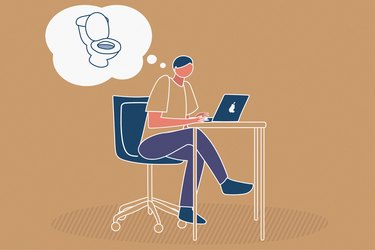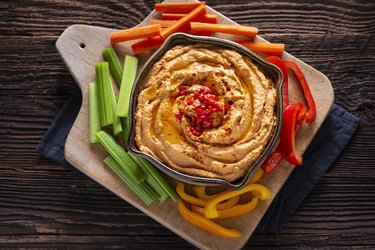
Your gut works hard for you all day, every day, digesting food, helping your immune system function, managing your mood and more. Showing it some love when you first wake up can help your GI tract function at its best — and in turn, support your health as a whole.
"Engaging in healthy habits and behaviors first thing in the morning can set the tone for the day and lead to more healthy habits overall, which can improve gut health," says Aditya Sreenivasan, MD, a gastroenterologist at Lenox Hill Hospital in New York.
Video of the Day
Video of the Day
And in fact, the most effective practices also happen to be some of the simplest. Here, Dr. Sreenivasan shares his top five morning habits for better gut health. They're so easy, you can start them tomorrow.
1. Drink a Glass of Water
Before you reach for that coffee, help yourself to a glass of H2O.
"Taking the opportunity to drink a glass or two of water every morning is a great way to get a jump on drinking an adequate amount throughout the day," Dr. Sreenivasan says.
That's important from a GI perspective because people who don't get enough water are more prone to problems like bloating, indigestion, constipation and overeating, he adds.
As for the purported benefits that drinking warm or hot water in the morning is somehow better for your system? It's fine to warm up your water if that's your preference, but there's nothing wrong with cold water either.
"It doesn't matter what temperature the water is. Within seconds of entering your body it will become the same temperature as your body," says Dr. Sreenivasan.
2. Try to Eat Around the Same Time Each Morning
Eating a wholesome breakfast will help power you through the day. And if you try to dine around the same time each morning, it can also help to keep you regular.
"Having a set schedule for waking up and eating breakfast can help your body regulate the release of various hormones that control things like when you have your bowel movements," explains Dr. Sreenivasan.
That can be especially helpful if you're experiencing constipation or are trying to manage IBS.
3. Eat a Fiber-Rich Breakfast
Speaking of breakfast, make a habit of reaching for one that's got some roughage. Upping your fiber intake can improve the health of your microbiome in as little as two weeks, according to a March 2021 study in mSystems. Plus, it acts as a natural remedy for constipation by making stools bulkier and easier to pass.
"An ideal breakfast would have a combination of whole grains, protein and fruits and vegetables," Dr. Sreenivasan says. (Think: oatmeal with almond butter and berries, or a veggie omelet with whole-grain toast.)
On the other hand, consider saving the bacon or sausage for once-in-a-while treats. "Classic breakfast meats are associated with inflammation in the GI tract and have been shown to increase the risk of GI cancers like colon cancer," Dr. Sreenivasan says.
4. Take a Walk
Better heart health, weight control, a brighter mood, a stronger immune system. A daily stroll will do your body good in so many ways.
But here's one you might not have considered: Regular exercise can help prevent problems like constipation and bloating.
"When you move, it helps your digestive tract move as well, and prevents things from backing up," Dr. Sreenivasan explains.
5. Go When You Have To (but Don't Spend Too Much Time Waiting)
Sticking with a set schedule just might put your bowel habits on a natural timer. But if you're having an irregular or off day, don't head to the toilet just to sit there and hope something happens.
"Sitting on the toilet for too long, especially looking at your phone, can predispose you to developing hemorrhoids. Straining before you're ready to have a bowel movement can lead to hemorrhoids too," Dr. Sreenivasan says.
A better, more comfortable bet? Only head to the bathroom when you get the urge to go, even it means skipping your usual time. And if it takes more than five minutes to have a bowel movement, you're sitting for too long. "Try getting up and doing something else and come back when you need to," recommends Dr. Sreenivasan.
Is this an emergency? If you are experiencing serious medical symptoms, please see the National Library of Medicine’s list of signs you need emergency medical attention or call 911.


